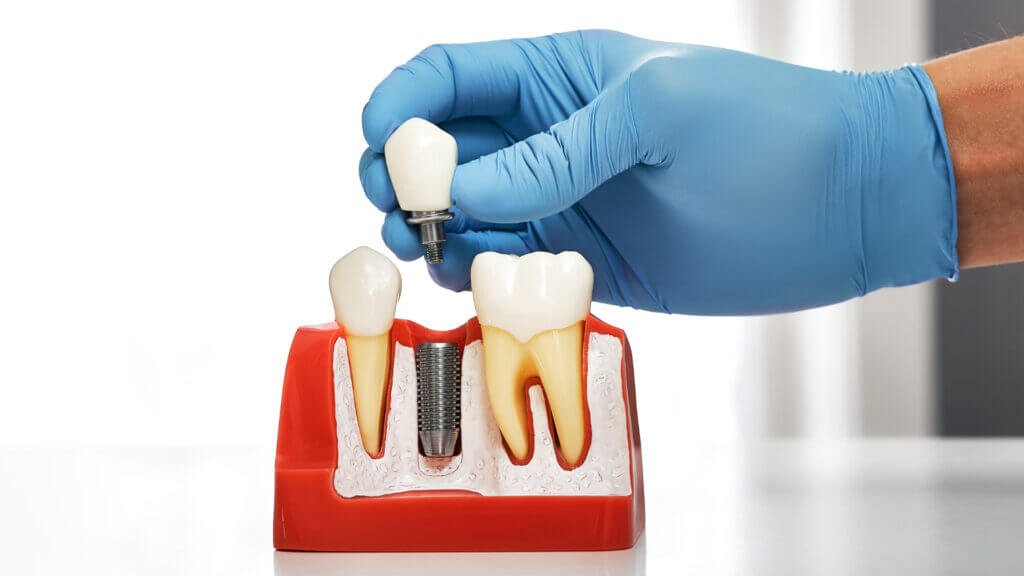Dental implants have a sound success rate of 95%.
In rare cases (in the healing phase) where an implant does not integrate with the jawbone:
- the failed implant is removed
- the area is allowed to heal
- a new implant is placed at no extra cost to the patient
Key Points Covered in This Blog
- The high success rate of dental implants and what happens in rare cases of failure
- Factors that affect implant longevity: bone health, hygiene, and lifestyle habits
- The risks associated with low-cost implant procedures and why expertise matters
- Innovations in implant technology, including smart implants, 3D printing, and regenerative medicine
- The future of dental implants and how new materials and monitoring systems are improving success rates
Factors That Influence Implant Success
Dental implants are considered highly effective in general. Certain factors do, however, impact their success in the long run.
Bone quality, oral hygiene, and lifestyle choices all come in to play in determining outcomes.
- Bone Integration: Conditions like osteoporosis or autoimmune disorders can slow healing. This affects implant stability. Proper bone grafting techniques help assure success.
- Oral Hygiene and Infections: Good hygiene practices and routine dental check-ups keep infections away and promote healthy healing around implants.
- Bite Alignment Issues: An uneven bite can put undue pressure on implants. This can result in complications with time. Addressing bite imbalances improves the implant’s life.
- Bruxism (Teeth Grinding): Clenching or grinding can stress implants. Night guards and other strategies help protect them from damage.
- Lifestyle Habits: Smoking and/or extreme alcohol use can delay healing. These habits also increase the risk of implant failure. Reducing or getting rid of these habits helps in better success rates.
The Risks of Low-Cost Implant Procedures
Choosing implant treatment based just on the price can lead to complications. Budget dentistry and dental tourism mostly prioritize speed and cost savings over long-term stability.
Poorly placed implants or substandard materials can result in implant failure and need corrective procedures. Working with experienced professionals promises precision, quality, and durability.
Innovations in Dental Implant Technology
Advancements in implant technology are improving patient outcomes. The procedures are becoming more efficient and long-lasting. Many patients are now exploring options like dental implants in Mexico, where they can receive high-quality care at a more affordable price. The procedures are becoming more efficient and long-lasting.
Smart Implants and 3D Printing
Smart implants now come with sensors that monitor bone adaptation, inflammation, bite pressure, etc.
These real-time insights help dentists catch issues early. This improves long-term results. Meanwhile, 3D printing allows customized implants based on each patient’s anatomy. It reduces production time and improves the fit.
Computer-Guided Surgery and New Materials
Computer-guided techniques increase precision in implant placement. This means less tissue damage and faster recovery.
Detailed 3D imaging helps decide the best implant positioning for stability. Materials like zirconia are an alternative to titanium and give better biocompatibility for patients with metal sensitivities.
Regenerative Medicine and Laser Technology
Stem cell therapy is changing dental implants by accelerating bone regeneration and enhancing healing.
This advancement lowers the risk of complications and strengthens implant foundations. Laser-assisted procedures further improve outcomes with the help of precise incisions, reducing bleeding, shortening recovery times, etc.
The Future of Dental Implants
Ongoing research is driving exciting developments in implant technology:
- Bioactive Materials: These materials interact with surrounding tissues for better healing and extend implant life.
- Health Monitoring: Future smart implants will give real-time data on implant performance. Dentists can address possible issues early on.
- Improved Coatings and Structural Designs: New coatings and reinforced designs will make implants even more durable and long-lasting.
As technology develops, implant procedures will continue to improve as well. One can reasonably expect better looks, functionality, oral health benefits, and more.
If you’re considering Dental implants London, go for an experienced provider. The right choice can make a big difference if it’s the comfortable and successful treatment you’re after.
